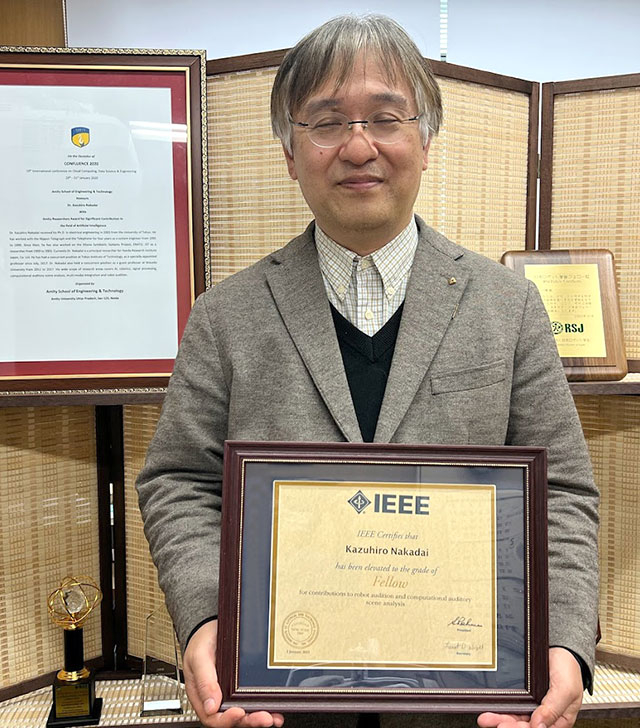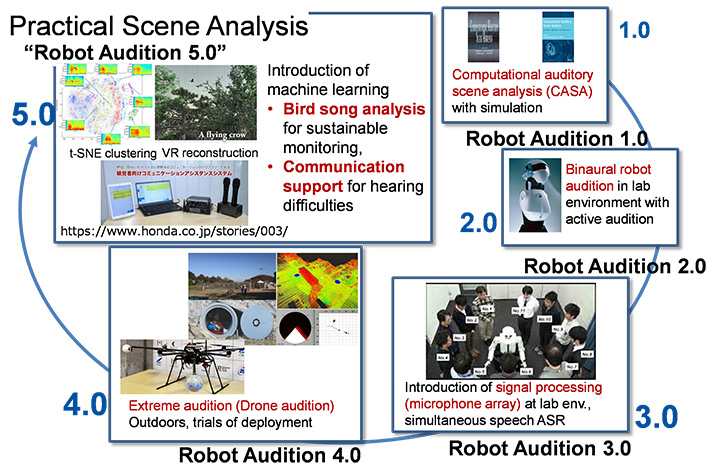Professor Kazuhiro Nakadai (Department of Systems and Control Engineering, School of Engineering), Professor Kenichi Okada (Department of Electrical and Electronic Engineering, School of Engineering), and URA Atsushi Hori (Integrated-Green-niX Consortium for Research and Human-Resource Development, School of Engineering) of Tokyo Institute of Technology have been awarded the title of Fellow of the Institute of Electrical and Electronics Engineers (IEEE), the largest and most prestigious society in the field of electrical and electronics engineering and information engineering. Award ceremonies and commemorative lectures were held for each research area, and all three were honored together at the IEEE Tokyo Section’s general meeting held online on March 17.
About IEEE Fellow
IEEE is a professional organization that contributes to technological innovation for the benefit of human society, with more than 400,000 members in 160 countries. Fellow is the highest rank of membership and is awarded to a person who has been a Senior Member for at least five consecutive years, who has attained exceptional qualifications and experience in a field designated by the IEEE, and who has made a significant contribution in that field. Only 0.1% of the membership is recognized each year for this achievement award, and members of the Fellows Committee established at IEEE Headquarters conduct a rigorous review process to determine elevation.
Professor Kazuhiro Nakadai
Reason for award
Contribution to Robot Audition Technology and Its Application to Computational Auditory Scene Analysis
Comment From Professor Kazuhiro Nakadai

Professor Nakadai
I am honored to receive the title of Fellow from the IEEE. This is an international recognition of the series of research efforts and results, including proposals for research fields, research and development of technologies, and real-world implementation and deployment efforts of the robot audition research that I have been engaged in for many years.
Robot audition is a research area that I proposed with Prof. Hiroshi G. Okuno (Professor Emeritus, Kyoto University, now at Waseda University) under the slogan “Creating ‘robot ear’ functionality” in 2000, as a research topic originating in Japan. Since a robot’s ears receive a mixture of various sounds, the ability to distinguish between sounds is essential. To achieve this functionality, we have continued to lead the world in research, focusing on binaural processing that mimics humans and other living organisms, microphone array processing using multiple microphones, and machine learning-based processing as exemplified by deep learning.
In 2008, HARK (Honda Research Institute Japan Audition for Robots with Kyoto University), an open-source software package of robot audition technology, was released to the public and has remained available to this day, with annual updates and hands-on tutorials for the public. Currently, HARK is being used as a starting point for other developments such as search-and-rescue robots, bird song analysis technology, and communication support systems for the hearing difficulties. The term Robot Audition was also recognized by the IEEE Robotic and Automation Society in 2014 as an official keyword to describe the research field.
This achievement would not have been possible without the help of all of you who have provided guidance and support. I would like to take this opportunity to express my deepest gratitude to my former employer, Honda Research Institute Japan, as well as to the professors and students at universities in Japan and abroad who have conducted joint research with us, and to the students and staff at the Nakadai Laboratory, including alumni and former students.

Summary Chart of Research Results: Changes in Robot Audition Research







